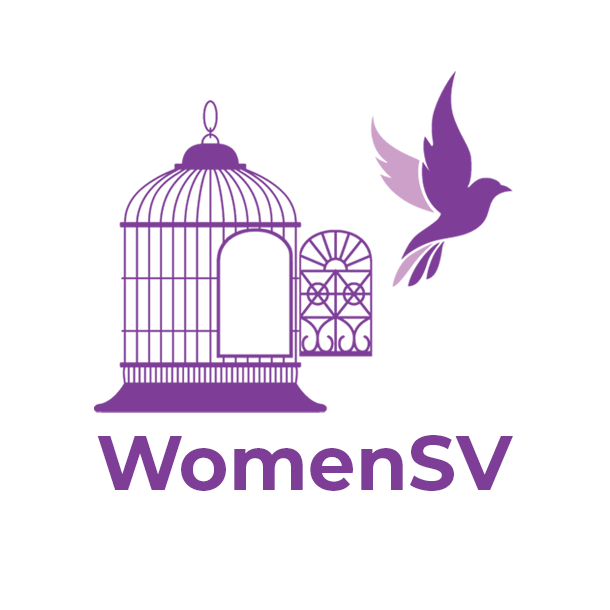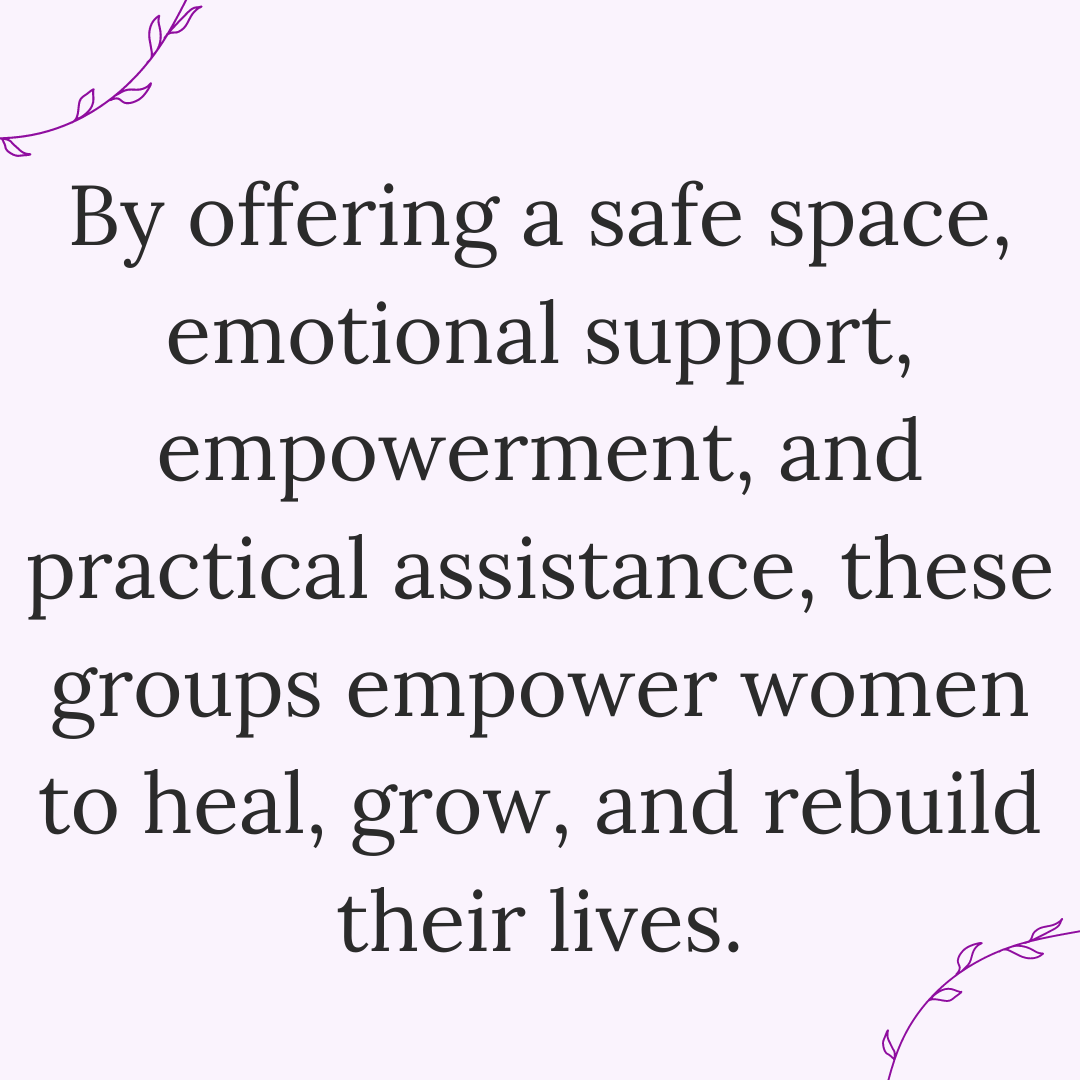Domestic Abuse Survivor Support Groups:
Empowerment Through Education, Support and Community
Surviving subtle forms of domestic abuse such as covert abuse and coercive control can leave individuals feeling isolated, misunderstood and unsupported. Domestic abuse survivor support groups can empower survivors on their journey towards freedom and recovery. Virtual support group meetings provide validation, education, support and safety planning to aid survivors of domestic abuse.
Please note that WomenSV does not directly offer support groups.
The organizations and support groups listed below are not facilitated by or affiliated with WomenSV. Conduct thorough research to determine if an option is right for you, and contact the organization directly with any questions.
Finding the right survivor support group for you
There are many excellent resources available for domestic abuse survivor support groups. When searching for a support group, it’s important to keep in mind your goals and the type of environment that would be most helpful for your unique circumstances.
Here is a list of organizations that offer online domestic violence support groups:
- Next Door Solutions to Domestic Violence: view information about their support groups here and their support group calendar here. If you have any questions about joining their support groups, please call their 24/7 hotline at (408) 279-2962 or email info@nextdoor.org.
-Wind Haven Foundation
- YWCA
- WOMAN, Inc.
- NARIKA
- PAVE: Click here for support group registration.
- SAVE
To identify additional domestic abuse survivor support groups in your area, contact the National Domestic Violence Hotline at 1-800-799-SAFE / 1-800-799-7233.
Benefits of joining a support group
Peer-to-peer, advocate-led support groups might take an educational rather than therapeutic approach to empower survivors with knowledge and understanding. Education serves as a powerful tool in addressing and overcoming covert abuse. It can help survivors make sense of their experiences, realize they are not alone, and learn strategies to protect themselves in the future. By shedding light on the dynamics of covert abuse and coercive control, survivors can reclaim their agency, build resilience and find hope again that tomorrow can indeed be better than today.
Support groups create a safe space for survivors to share their experiences with others who “get it.” Together, participants overcome isolation and begin to build a sense of community and support, lifting each other up, as each individual survivor moves through her own journey towards freedom, safety and peace.
Studies show that support groups lead to survivors feeling a greater sense of belonging and higher self esteem, while experiencing less distress. Abuse happens in isolation. Recovery unfolds in community. Participating in an educational support group offers numerous benefits for survivors:
Validation and support
In a supportive group setting, survivors can share their stories and experiences without fear of judgment. Connecting with others who have walked a similar path can provide validation, encouragement and reassurance, reminding survivors that they are not alone in their journey.
Knowledge and understanding
Educational support groups offer valuable information about the different forms of abuse, their effects on survivors, and the dynamics of abusive relationships. This knowledge equips survivors with the tools they need to recognize abusive behaviors, understand the cycle of violence, and make informed decisions about their safety and well-being.
Empowerment and agency
Through education, survivors can reclaim their power and agency, breaking free from the cycle of abuse and taking control of their lives. Learning about healthy boundaries, assertiveness, and self-care empowers survivors to advocate for themselves and establish fulfilling relationships built on mutual respect and trust.
Recovery
Education serves as a powerful catalyst to help survivors break toxic cycles, find triumph after trauma, rebuild their self-esteem, and envision a future free from abuse. By understanding the root causes of domestic abuse and exploring healthy coping mechanisms, survivors can embark on a journey of self-discovery and transformation.
Understanding covert abuse and coercive control
Covert abuse and coercive control are often misunderstood or overlooked forms of domestic abuse. These tactics, which can include manipulation, gaslighting, financial control, and isolation, are designed to exert power and control over the victim. Understanding these dynamics is crucial for survivors to recognize the abuse they've experienced and break free from the cycle.
Supporting recovery from domestic abuse
Recovering from domestic violence is a complex and nonlinear process that requires time, patience, and support. This is where a trauma informed therapist can be instrumental.
The focus of peer-led and advocate-led support groups is on education, validation, safety planning and empowerment. These types of support groups are not intended to provide or replace therapy.
Survivors might also want to explore the benefits of a support group led by a therapist with a stronger focus on processing and healing from the psychological, emotional and behavioral wounds created by living in a state of chronic stress, anxiety and trauma.
While each survivor's journey is unique, the following principles can guide the process:
Boundaries
Empowerment begins with getting back in touch with what matters to us, identifying our core values and the characteristics, attitudes, core values we are looking for in a dating partner or mate. What can we live with? What things are negotiable? What are deal breakers? How do we address violations of our boundaries? We explore all these areas in the process of learning to establish boundaries that can help keep us safe in our relationships.Setting boundaries and prioritizing self-care
Learning to set boundaries and prioritize self-care is crucial for survivors to protect their physical, emotional, and psychological safety. Establishing healthy boundaries early on helps survivors assert their needs, communicate effectively, and cultivate relationships based on respect and mutual consent.Building a support network
A strong support network is essential for survivors as they navigate the challenges of addressing and overcoming covert abuse. Whether through peer to peer, educational or therapeutic support groups, individual therapy with a trauma informed and covert abuse informed therapist, or through trusted friends and family members, having a supportive community can provide encouragement, validation, and practical assistance, as well as comfort, a growing sense of safety and solidarity and even hope.Seeking professional help when needed
While support groups and peer support are valuable resources, survivors may also benefit from individual therapy or counseling to address trauma-related symptoms and complex emotional issues. Trauma-informed therapists with expertise in covert abuse and coercive control can provide support, guidance, and evidence-based interventions to facilitate healing and recovery. Click here for tips on choosing the right therapist or counselor.
Why join a virtual support group?
Most domestic abuse survivor support groups take place online rather than in person. Virtual domestic violence support groups provide a safe environment for survivors to connect with each other to overcome their isolation, learn about the dynamics and impact of covert abuse, and develop strategies to deal with it more safely and effectively. Online meetings offer flexibility and accessibility, allowing participants to engage from different locations while fostering a sense of community and solidarity.
Domestic violence support groups for women
Domestic violence support groups for women offer a safe, understanding space to be in community with survivors and advocates. The online domestic violence support groups listed at the top of this page are women’s support groups for domestic violence survivors. They can be helpful to survivors before, during and after escaping a relationship. So whether you are searching for support groups for women in abusive relationships, or support groups for women who have been abused, there are a variety of resources available to assist you.
Support groups for men
Domestic violence crosses all demographic boundaries, including gender, and it happens to men too! Support groups for men who have experienced domestic violence are available and accessible online. Next Door Solutions to Domestic Violence offers support groups for men, with more information about their support groups and a support group calendar available on their website.
Take the first step towards freedom
Being involved with a covert abuser is always dangerous, but sometimes it’s less dangerous to stay, at least for a little while longer, as she continues to reach out, gather friends and allies, do research, develop a safety plan, and, if and when she chooses, a well thought out exit strategy. Support groups can help survivors make an informed decision after considering all their options, and running their own cost-benefit analysis.
Overcome covert abuse and coercive control with support from our online workshop
If you have experienced coercive control, it can be challenging to explain what you've been through in a way that others can easily understand. Understanding and Documenting Coercive Control: Executive Summary Workshop is a 90-minute, self-paced online program that will empower you with the words to tell your story so that you can get the support and protection you deserve.
Click here to learn more and sign up for instant, lifetime access.
Related articles
WomenSV’s Ruth Darlene Patrick On Why Support Groups are Important for Domestic Violence Survivors
When survivors of domestic violence sever their ties with abusive relationships, they are frequently plagued with feelings of seclusion and desolation. Support groups provide a sense of community and fellowship with other individuals who have undergone similar experiences. Ruth Darlene, the Executive Director of WomenSV, emphasizes that "support groups provide a safe place for women to share their stories, feel validated, and receive support and encouragement from other people who have been in similar situations."
Read more
Ruth Darlene Patrick, WomenSV, on Healing After Domestic Violence
Ruth Darlene Patrick, recognizing the transformative impact of support groups, explains, "Being surrounded by individuals who truly understand and empathize with your journey can be immensely empowering. It reminds survivors that they are not alone and that healing is possible."
Read more
Empowering Survivors: Women’s Domestic Violence Services and Support Groups
Support groups play a crucial role in the healing journey of domestic abuse survivors. Women’s domestic violence services facilitate survivor support groups, where individuals can share their experiences, connect with others who have faced similar challenges, and receive validation, understanding, and encouragement. These groups create a sense of community, reducing isolation and providing a platform for empowerment and personal growth.
Read more
Benefits of Domestic Violence Support Groups for Women
Domestic violence support groups offer a safe and non-judgmental environment where women can connect with others who have experienced similar situations. These groups are often facilitated by trained professionals, such as therapists or social workers, who provide guidance and ensure a supportive atmosphere. Sharing their stories within a supportive community of survivors can help women validate their experiences, gain perspective, and realize they are not alone in their struggles.
Read more
DV Support Groups: Empowering Domestic Violence Survivors
Survivors of domestic violence often face physical, emotional, and psychological trauma, making it crucial for them to receive support and guidance as they rebuild their lives. Support groups specifically tailored to the needs of domestic violence survivors play a vital role in this process, offering a safe space for healing, empowerment, and community.
Read more
Resources for Covert Abuse Survivors
Covert abuse, also commonly referred to as psychological or emotional abuse, is a form of abuse that leaves no visible scars but inflicts deep emotional wounds on its victims. Unlike physical abuse, covert abuse is often subtle, manipulative, and difficult to detect. Survivors of covert abuse often suffer in silence, unaware of the resources available to support them on their journey to healing and reclaiming their lives. However, it’s important to know that help is out there.
Read more
WomenSV: Empowering survivors of domestic violence
WomenSV empowers an often-overlooked population – women who are trapped in a relationship with a powerful, sophisticated abuser.
Read more









